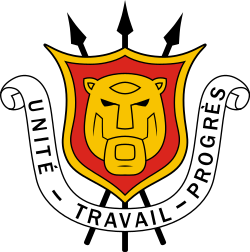 |
|---|
This is a list of current provincial governors in Burundi, as of 2025. [1]
| Provinces | Governor |
|---|---|
| Buhumuza | Dénise Ndaruhekeye |
| Bujumbura | Aloys Ndayikengurukiye |
| Burunga | Parfait Mboninyibuka |
| Butanyerera | Victor Segasago |
| Gitega | Liboire Bigirimana |
 |
|---|
This is a list of current provincial governors in Burundi, as of 2025. [1]
| Provinces | Governor |
|---|---|
| Buhumuza | Dénise Ndaruhekeye |
| Bujumbura | Aloys Ndayikengurukiye |
| Burunga | Parfait Mboninyibuka |
| Butanyerera | Victor Segasago |
| Gitega | Liboire Bigirimana |